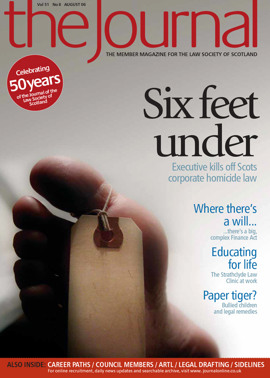Eyes on the ball

The Scottish Parliament’s Justice 2 Committee produced its stage 1 report just before the parliament rose for the summer. It has given the Office Bearers and those at the Society dealing with these matters (the bill team) a chance to catch up and consider the way forward over the summer.
The report raised a number of issues to which the Scottish Executive must respond. The next step is for the Executive, following that response, to table any amendments that it wishes at the stage 1 debate, scheduled for early September, or possibly later at stage 2.
The profession’s engagement in this process to date has been extremely important and the fact that out of 605 responses to the committee’s consultation, 550 were from the profession or legal organisations speaks volumes about the very real concerns about the bill’s proposals. The bill team will continue to keep the profession updated by email and I would urge all members with concerns to respond.
Many of the questions asked and issues identified by the Justice 2 Committee mirrored concerns already expressed by the Society, and it is very important that these questions are answered clearly and fully before the proposals become law.
Importantly, the Scottish Executive’s and the majority of the Committee’s view was that the Society should continue to deal with conduct complaints.
Other key issues in the Committee’s report, which coincide with some of the Society’s concerns, were the lack of independence in the appointment of board members of the Scottish Legal Complaints Commission (SLCC), and the lack of an external appeal system. Its suggestions are, respectively, that the former involves the Lord President or the Judicial Appointments Board and the latter is dealt with by an independent tribunal rather than the courts.
The Committee commented that expenditure must be independently audited, that the budget consultation should be meaningful, and importantly, that case fees should not be levied unless a complaint is upheld. The report, helpfully, asks for clarification of the reasons for raising the maximum compensation limit to £20,000 and also how conduct and service complaints, where both elements are present, will be dealt with in practice.
The recognition of the need to monitor access to justice should solicitors decide to withdraw from certain types of work as a consequence of the financial implications of the bill is also a positive step. The Committee seeks an assurance that a proper test for negligence will be applied, and feels that the SLCC should have power of oversight over both the Master Policy and the Guarantee Fund. It does, however, seek clarification from the Executive on disputes between the SLCC and the professional bodies or insurers.
The Society continues to offer to work with the Executive and the Committee to resolve any concerns that may exist and to ensure that the bill is workable, cost effective and fair to both solicitors and the public.
Meanwhile, south of the border the committee report on the Legal Services Bill has been published. That bill contains provisions for Alternative Business Structures (ABS) which are not included in the Scottish bill. It seems that there is little clarity on the appropriate regulatory model that will be required for ABS. How to handle matters of legal privilege, claims on indemnity insurance policies and more importantly on the indemnity fund in England and Wales, which is similar to our Guarantee Fund, remain quite unclear and, apparently, not thought out.
A number of leading law firms, however, have announced that they are unlikely to take advantage of any proposals allowing outside investment due to fears that it would prevent them from operating in other countries, particularly in the European Union.
The overriding concern is that these firms will only adopt a structure that is permissible in the United States, continental Europe and in Asia. This feeling may be of significance to the larger Scottish firms competing with firms in the south, in terms of maintaining a level playing field.
I am delighted that communications with the profession on the bill and other issues are working well, with a very high number of ”hits” on the website on topics covered in the Society’s new members’ e-zine. The feedback on the e-zine, emails to the profession and the website has been very encouraging and I am delighted to continue the emphasis on good communications from the Society.
The Society’s conference on the independence of the Scottish legal system on 6 September will involve a debate following some thought-provoking talks about whether Scotland’s democracy and the independence of the legal profession are threatened by increasing state control.
The debate and the bill herald interesting times for the Society with significant consequences for it and for the profession. I am looking forward, with many in the profession, to meeting the challenges and making the most of any opportunities.
In this issue
- Ireland 4, Italy 0
- A lack of trust
- Technology and the Scottish courts
- For supplement read tax - an update
- Eyes on the ball
- Don't leave gaps in regulation
- Keeping company
- Fighting the bullies
- The university of life
- A lack of trust (1)
- With these few words...
- Tell it like it is
- All that sparkles ain't gold
- PDF is the standard
- The paper monster
- Safeguarding fair trial
- New law, new problems
- Raising the stakes
- Mark the pre-proof
- Scottish Solicitors Discipline Tribunal
- Website reviews
- Book reviews
- It takes two to tango
- Land attachment and suspensive missives
- PSG's suite moves






